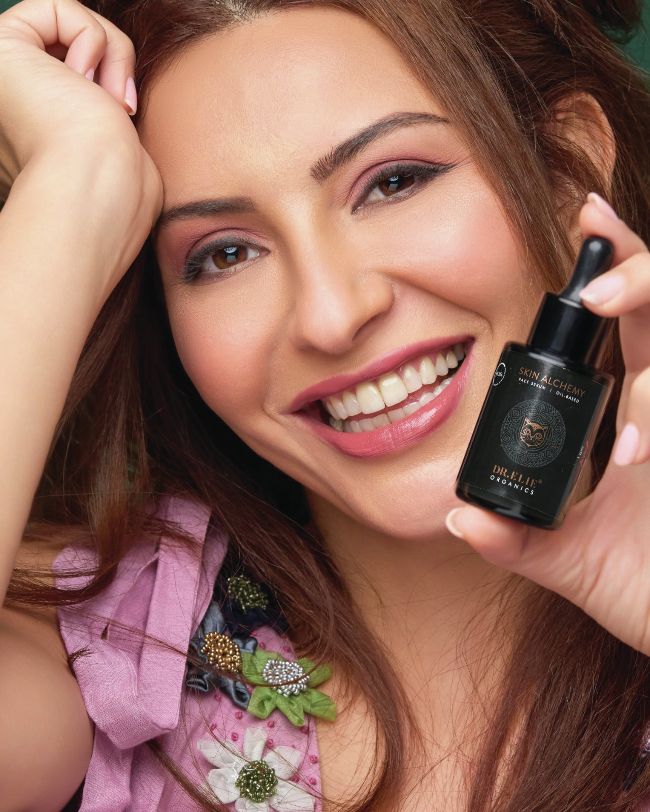RETHINK Beauty
In a country like India, where resource conservation is critical, eco-friendly salons can lead the way in promoting a cleaner, greener future for the industry and the planet. It is time for the salon industry to make sustainability an integral part of their business, and not look at it as a one-off effort. There are visionary entrepreneurs who are already making eco-friendly practices a part of their daily business. Kanishka Ramchandani looks at how far the Indian salon industry has progressed on the green path.

Climate change is accelerating, with global temperatures rising by approximately 1.1°C since the late 1800s, largely due to human activities. According to the UN, if emissions continue unchecked, the world could surpass 1.5°C of warming as early as 2030, leading to more extreme weather and irreversible environmental damage. Adding to the climate change crisis is the rapidly depleting natural resources, which poses a serious threat to life as we know it. So, what can the salon industry do about this global problem?
Small steps go a long way when it comes to sustainability. Apart from the three Rs – Reduce, Recycle, Reuse – it is consistency that matters the most. Most salons start their green efforts but give up halfway, either due to rising costs or non-compliance by the staff. It is important to maintain your green stance and create awareness about it instead of making half-hearted efforts. Like with any other business, a green salon calls for a customised business model and methodology. It includes selection of products and devices, changes in the interiors, staff education, marketing and communication and finally, customer awareness. Making your salon an ecofriendly and sustainable one will not only help you create a unique brand identity; it will also put you on the path to long-term profitability, customer loyalty and a positive impact on the planet.
Earth Month is observed every April as a global initiative to raise awareness about environmental issues and promote sustainable living. It began with the first Earth Day on April 22, 1970, which sparked a global environmental movement. Throughout the month, individuals, communities and organisations come together to support eco-friendly practices. Small, consistent actions can lead to significant change – that’s the message of Earth Month. In keeping with our theme of sustainability, to mark Earth Month, we look at how salons in India are making an impact with their green initiatives.

DR KOCHHAR, CHAIRPERSON, BLOSSOM KOCCHAR GROUP OF COMPANIES
PROGRESSING ON THE GREEN PATH
The Indian salon industry has raised the bar for sustainability quite considerably in the past decade. For example, the Blossom Kochhar Aroma Magic Green Salons have been created as reliable solutions based on green science. Dr Kochhar recounts, “I noticed that many salons were consuming excessive amounts of water and electricity, and also contributing to noise pollution. That’s when we decided to take a different approach. We started our journey with Green Salons as early as 2007. From the beginning, we paid close attention to every small detail—incorporating natural elements into the interiors, using eco-friendly materials, and promoting sustainability at every level.”
Ritesh M Lamba, Operations Head, Aveda x Nykaa Lifestyle Salon, states, “A decade ago, eco-conscious salons were rare, but today, both businesses and consumers actively seek green alternatives. Many now prioritise sustainable infrastructure, invest in renewable energy sources and opt for ethically sourced, cruelty-free products. Waste management and energy conservation have also gained traction.
This shift is driven by increased environmental awareness, stricter regulations, and a growing desire for responsible consumption. The industry is steadily becoming greener and more ethical.”
Dr Elie Tahmaseb, CEO and Founder, Dr Elie Organics, points out: “For a salon to be eco-friendly, the difficulties are with hair services, specifically hair colours, and nails. In these two areas, we still use a lot of chemicals. In our salon, we try to use ammoniafree tubes, which, many clients don’t want as the colour doesn’t last long. Most of the foreign brands that are coming into India are full of chemicals.”

DR ELIE TAHMASEB, CEO AND FOUNDER, DR ELIE ORGANICS
INGRAINING GREEN VALUES
Sustainability in beauty is no longer a trend—it’s a transformative movement shaping salon experiences across India. Dr Kochhar, Chairperson, Blossom Kocchar Group of Companies, asserts, “We must become more eco-conscious—not just for ourselves, but for the future generations. Clean air, pure water, and a healthy environment are essential. Sustainability isn’t just a trend—it’s a necessity. We need to prioritise clean beauty, reduce chemical usage and make choices that support the well-being of both people and the planet. Ignoring this will only lead to more health issues, stress, and long-term damage. It’s time we all take responsibility and do our part.”
Lamba explains, “Sustainability isn’t just a commitment at Aveda, it’s at the heart of everything we do, and it resonates through our partnership with Nykaa Salons. As a certified B Corporation, Aveda meets the highest standards of social and environmental performance, transparency, and accountability. We are also proud to be the first beauty company to manufacture products using 100 per cent wind and solar power, a commitment prominently showcased across our salons.

RITESH M LAMBA, OPERATIONS HEAD, AVEDA X NYKAA LIFESTYLE SALON
Our approach to sustainability is rooted in these core principles: 100 per cent vegan formulations, ethically sourced ingredients, use of 100 per cent post-consumer recycled (PCR) packaging, and a focus on minimising our environmental footprint at every level. At Aveda x Nykaa Salons, we ensure that every aspect of our operations, from product selection to salon interiors, aligns with our mission of caring for the world while delivering high-performance beauty solutions.”
Dr Elie says, “The sustainability approach that we have integrated into our salon and clinic begins with the kind of services we provide. We use our own organic products, with eco-friendly, sustainable packaging. Overall, we have reduced the usage of chemical products.
INTEGRATED APPROACH
In a salon set-up, sustainability cannot be practised in-silo. Running a salon involves team work, collaboration with vendors and providing service to a diverse group of customers. Lamba suggests the following ways to integrate your team’s work ethics with your sustainable efforts:
• Regular training, educating staff on responsible product usage, water conservation and waste reduction.
• Hands-on workshops that reinforce green practices in daily salon operations.
• Incentive programmes to encourage staff to actively contribute to eco-conscious initiatives.
Dr Kocchar states, “With the right training and by helping the staff see the benefits firsthand, it was easy to align their work ethics with our green philosophy. They felt better, they believed in the mission, and that made all the difference!”
Dr Elie recounts, “Aligning my staff with the ethics and mission of my company was a difficult job, but I am grateful that my core team is understanding and supportive. My core team and I have educated the staff members daily, showing them videos and news and explained to them how their actions can affect themselves, nature, India, and, of course, the whole world. Making them understand this was difficult initially, but I am grateful they are supportive, and we are reaching where we planned to reach.”
TURNING CHALLENGES INTO OPPORTUNITIES
While salons are aspiring to be eco-friendly, it is a movement that has its own unique set of challenges. One of the primary hurdles is cost. Eco-conscious products, energy-efficient equipment and sustainable packaging often come at a premium, making it difficult for smaller salons to adopt these changes without affecting their bottom line.
Availability and accessibility of genuinely green products can also be limited, especially outside metropolitan areas. Many salons struggle to verify the authenticity of brands claiming to be organic or eco-friendly, as greenwashing remains a concern in the market.
Infrastructure limitations pose another challenge. Retrofitting existing salons with solar panels, water-saving systems, or waste segregation units can be both logistically complex and expensive.
Finally, there’s the issue of client expectations. Many customers still associate beauty services with luxury and indulgence rather than responsibility, making it essential for salons to educate clients and shift mindsets.
Dr Kocchar has found workable solutions to some of the challenges. She explains, “We now focus on conserving water by using efficient pumps, using eco-friendly paints on the walls, and installing green walls filled with plants to bring nature indoors. We avoid using harsh chemicals in our hair treatments and have even installed solar panels to reduce our dependence on conventional electricity.”
Dr Elie elaborates, “We’ve faced challenges both in services and products. In services, we lost many clients because we have said no to many chemical products. For example, Hair Botox contains formaldehyde. When it comes in contact with heat, it releases harmful smoke, which affects our lungs and hormones and is cancerous, too. So, we stopped using this product and replaced it with another organic product, with results that are no as long lasting. And we ended up losing clients. Similarly, our shampoos don’t contain SLS, ammonia, parabens and sulphates. Because we don’t use any of these chemicals, we don’t get the same amount of foam. This makes people think their scalp isn’t getting clean, even though they don’t realise they’re harming themselves, the water and the soil. Replacing these products and making people understand why we are doing this was very difficult. There’s no way to reverse the damage.”
GOVERNMENTAL SUPPORT
The Indian government has not introduced salonspecific sustainability schemes yet, but there are several broader policies, subsidies and initiatives that ecoconscious beauty businesses can benefit from.
1. MSME schemes
Most salons fall under the Micro, Small & Medium Enterprises (MSME) category. Through the MSME Ministry, businesses can access subsidies for sustainable infrastructure, energy-efficient equipment and waste management systems under schemes like:
2. Startup India and Stand-Up India initiatives
Green beauty startups, including sustainable salons or organic beauty product lines, can benefit from tax exemptions, funding access and mentoring under these government-led initiatives.
3. Renewable energy subsidies
The Ministry of New and Renewable Energy (MNRE) offers subsidies and incentives for businesses installing solar panels—ideal for salons looking to shift to clean energy.
4. Plastic waste management rules
While regulatory in nature, these rules are pushing salons to eliminate single-use plastics and adopt recyclable, refillable packaging—encouraging more sustainable operations.
5. Skill development programmes
Programmes under National Skill Development Corporation (NSDC) and the Beauty & Wellness Sector Skill Council (B&WSSC) now incorporate sustainability modules, helping train staff in ecofriendly practices.
Regarding her expectations from the authorities, Dr Elie shares, “I have a request for the government, which will help India grow economically and become a better place for people to live. The government needs to be more conscious when they are giving permission and approval for foreign products to enter India. If the government puts a stop to chemical-based brands entering India, it will make India an organic country. India is the root of the word ‘East,’ and the same goes for Persia. Skincare and perfume industries started from the East, but that’s no longer recognised. Promote more entrepreneurs to start businesses and make products in India. Help India grow, create more jobs for people, and show the world that everything started from India. We should be proud of the products made in India, by Indians and exported to other countries. That is my dream — for my brand to reach all over the world with the tag ‘Made in India.’”
SMALL STEPS, BIG IMPACT
Turning your salon into an eco-friendly one is a costintensive exercise. But you don’t have to do everything at one go nor are you expected to do it 100 per cent. Here are a few ways in which you can take your salon onto the green highway:
• Switch to vegan, cruelty-free, and ethically sourced products
• Partner with brands that use post-consumer recycled (PCR) or biodegradable packaging
• Install water-saving fixtures like low-flow taps and eco-shower heads to help conserve water
• Transition to energy-efficient LED lighting and solar power (if feasible) to lower the carbon footprint and reduce electricity bills
• Salons can also segregate waste—separating hair, plastic, foil, and chemical waste—and collaborate with local recycling services
• Redesign interiors with sustainable materials like bamboo, reclaimed wood and low-VOC paints can enhance both aesthetics and eco-credentials.
• Encourage digital billing and appointment systems further reduces paper usage.
• Train your staff and educate your clients via signage or loyalty programmes that reward ecoconscious choices.
“If I had to choose just one element to make eco-friendly, it would be the cosmetics and products used in the salon. Natural cosmetics are incredibly important because they come in direct contact with the client’s skin and hair and also affect the health of the therapists who use them daily. By switching to natural, chemical-free products, salons can significantly reduce health risks while also being kinder to the environment. It’s a simple yet powerful step that benefits everyone involved,” opines Dr Kochhar.
Lamba suggests, “Switching from traditional towels to biodegradable, disposable cotton-based towels is a great way to be more eco-friendly as a salon. Traditional salon towels require excessive water and energy for washing, contributing to waste and pollution. In contrast, disposable cotton towels are not only highly absorbent but also decompose quickly, reducing environmental impact. This simple shift can drastically cut down water usage while maintaining an excellent client experience.”
Dr Elie says, “I recommend choosing the right shampoo and conditioner as it is the most common service at any salon. If your product has harmful chemicals, when you rinse the hair, the chemicals go in the water, they contaminate the soil and pollute the rivers. From the rivers, they go back to our farmland, and eventually come back to our bodies. This is affecting our health in a very drastic way. We are ruining life in the water and the soil. If the shampoo and conditioner you use is organic, it would help this industry, the country and the world on a very large scale.”
CONCLUSION
As we observe Earth Month and gear up for Earth Day on April 22, it’s the perfect time for the salon industry to reflect on its role in creating a healthier planet. Salons may seem like small businesses, but their cumulative impact—through the products they use, the energy they consume and the waste they generate—is significant.
This Earth Month, let’s commit to small, consistent actions that collectively lead to big change. Because when salons choose sustainability, they do more than serve beauty— they serve the planet.